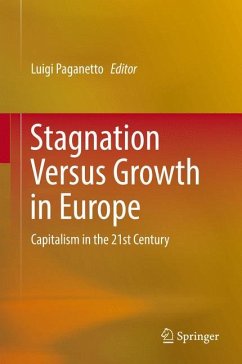This book explores the debate on the policies required to overcome the crises of 2008 and 2011, in which the focus on short-term measures has overshadowed the need to analyze the low growth rate in the European Union, and especially the Eurozone, as the basis for interventions that will counteract the tendency toward stagnation. Factors that lie at the root of the low growth are examined in depth, covering, for example, the impact of the demographic trend toward an aging population in Europe, consequences of inequality for growth, challenges posed by technological change, competition from emerging countries, and difficulties in improving European governance. In addition, potential actions to foster innovation and avoid long-term stagnation, such as new measures to open up markets, stimulate competition in services, and promote green growth, are discussed. The book comprises a selection of contributions presented at the XXVII Villa Mondragone International Economic Seminar, which brought together renowned economists and representatives of a broad range of countries and leading international institutions. It will appeal to all who are interested in the latest thinking on stagnation/growth, inequality, governance, competitiveness, and innovation in Europe.
Bitte wählen Sie Ihr Anliegen aus.
Rechnungen
Retourenschein anfordern
Bestellstatus
Storno








